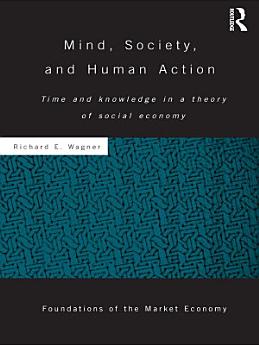Mind, Society, and Human Action: Time and Knowledge in a Theory of Social Economy
About this ebook
The many particular topics the book examines can be traced to two central ideas. Firstly, that economic theory, like physics, requires two distinct theoretical frameworks. One treats qualities that are invariant across time and place; this is the domain of equilibrium theory. The other treats the internal generation of change in societies through entrepreneurial action that continually transforms the ecology of enterprises that constitutes a society. Secondly, economic theory is treated as a genuine social science and not a science of rationality writ large. The book also explores ways in which life in society is understood differently once economics is treated as a social science.
The book is much of the hyper-formality that comprises economic theory these days fails to make reasonable contact with reality. It will be of interest to sociologists, political scientists, and researchers in law, public policy, Austrian economics, evolutionary economics, institutional economics and political economy.
About the author
Richard E. Wagner is Holbert L. Harris Professor of Economics at George Mason University, Fairfax, USA.







